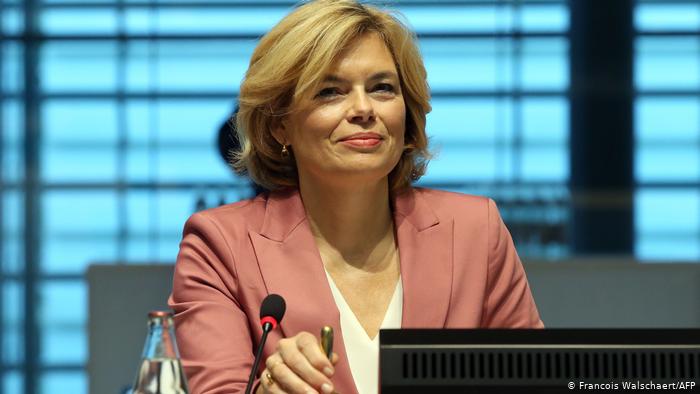Agricultural ministers from the member states of the EU have reached an agreement on reforming the Common Agricultural Policy. The deal, several years in the making, will place a bigger focus on environmental protection.
The EU member states announced on Wednesday morning in Luxembourg that they had come to an agreement over reforms to the Common Agricultural Policy (CAP).
The talks lasted almost two days before agricultural ministers from the EU member states were able to reach an agreement following a proposal by the German agricultural minister, Julia Klöckner.
The CAP allocates billions of euros and as such constitutes the biggest share of the EU's budget. Many farmers are dependent on money from Brussels in order to stay in business.
A long time in the works
"After a long and hard struggle, we've reached a milestone," Klöckner said in a live press conference following the finalization of the agreement.
She welcomed the new agreement on environmental protections while also ensuring that people in the EU would still be able to "put food on the table."
The German politician celebrated the deal with an announcement on Twitter, saying "we made it. A milestone for a reorientation of EU agriculture, with green architecture at its core.
For Germany, this means €1 billion of our budget will be used for ecological rules/biomeasures, while at the same time maintaining a balance with income and food security."
The EU Commissioner for Agriculture and Fisheries Janusz Wojciechowski also announced the agreement on Twitter and thanked the "German Presidency for its efforts to take forward the work of the former Presidencies and for tabling compromise proposals."
Under the new proposal, member states will have a greater level of freedom over how they achieve the agreed upon goals regarding the conservation of nature, environmental protection and ensuring food quality.
States will have to send their policy plans to be approved by the EU Commission. States must also offer further "eco-measures" which go beyond the obligatory environmental protections — any farmer who follows these voluntary rules will be given extra funds.
The new reform will come into effect in 2023 and includes a two-year "learning period."
Latest Stories
-
GSTEP 2025 Challenge: Organisers seek to support gov’t efforts to tackle youth unemployment
1 hour -
Apaak assures of efforts to avert SHS food shortages as gov’t engages CHASS, ministry on Monday
1 hour -
Invasion of state institutions: A result of mistrust in Akufo-Addo’s gov’t ?
2 hours -
Navigating Narratives: The divergent paths of Western and Ghanaian media
2 hours -
Akufo-Addo consulted Council of State; it was decided the people won’t be pardoned – Former Dep. AG
2 hours -
People want to see a president deliver to their satisfaction – Joyce Bawah
3 hours -
Presidents should have no business in pardoning people – Prof Abotsi
3 hours -
Samuel Addo Otoo pops up for Ashanti Regional Minister
3 hours -
Not every ministry needs a minister – Joyce Bawa
3 hours -
Police shouldn’t wait for President’s directive to investigate election-related deaths – Kwaku Asare
4 hours -
Mahama was intentional in repairing ties with neighbouring countries – Barker-Vormawor
4 hours -
Mahama decouples Youth and Sports Ministry, to create Sports and Recreation Ministry
4 hours -
Mahama’s open endorsement of Bagbin needless – Rabi Salifu
4 hours -
Police station torched as Ejura youth clash with officers
4 hours -
If Ibrahim Traoré goes civilian, it may be because of Mahama’s inauguration – Prof Abotsi
5 hours

